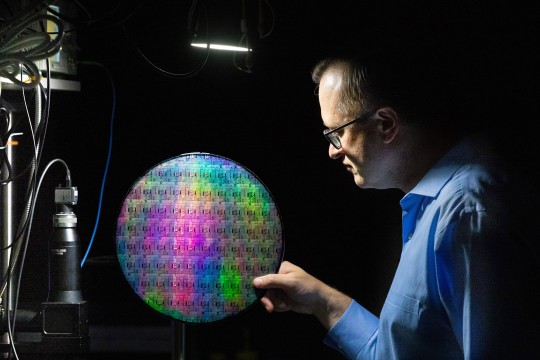Slaughter Announces $2.4 Million for Delphi/RIT Fuel Cell Project
Project seeks to create fuel-cell technology for commercial and military applications
A. Sue Weisler
Congresswoman Louise Slaughter was on the RIT campus March 13 to announce new funding for a partnership between RIT and Delphi Corp. to commercialize solid-oxide fuel cells for military and commercial applications.
Congresswoman Louise Slaughter today announced $2.4 million in federal funding for Delphi Corp. and Rochester Institute of Technology’s joint efforts to develop a cost-effective method to manufacture fuel-cell auxiliary power units. With this initiative, project researchers believe Delphi’s fuel-cell unit may be the first commercially produced solid-oxide fuel-cell unit to hit the market by as soon as 2012.
“I am proud to have secured federal funding to help make Rochester the world center for fuel-cell research, fuel-cell development, and ultimately fuel-cell manufacturing,” says Slaughter. “I applaud Delphi Corp. and RIT on their successes to advance local fuel cell development, a mission with tremendous potential for our nation’s energy security and Rochester’s economic future.”
Delphi has produced a prototype solid oxide fuel cell, a unit that produces electricity by “harvesting” hydrogen from diesel, biofuel or natural gas. The fuel cell achieves up to 40 percent more power than the traditional combustion engine. At the same time, RIT engineers have been working to identify options to minimize fuel cell life-cycle costs. Delphi and RIT have come together to merge their researchers and resources to develop a cost-effective way to mass-produce Delphi’s fuel cell technology.
“This important collaborative research program with Delphi further strengthens the region’s assets in sustainability and alternative energy and reinforces RIT’s commitment to innovation and our unique approach to corporate partnerships,” adds Bill Destler, president of RIT. “We especially appreciate Congresswoman Slaughter’s vision in sponsoring this initiative and her longstanding efforts on behalf of RIT and the greater community.”
“Thanks to the support of Congresswoman Slaughter, our research partnership with Delphi will enhance the development and implementation of alternative fuel technologies while also promoting RIT’s educational mission in sustainable production and renewable energy,” notes Nabil Nasr, assistant provost for academic affairs and director of the Center for Integrated Manufacturing Studies at RIT. “In addition, these efforts will ultimately increase the environmental quality of our transportation sector and advance the new energy economy in the Rochester region.”
The Delphi/RIT project is of keen interest to the Department of Defense, which would like to eventually implement this technology into its equipment. Additionally, the technology has significant potential for commercial applications.
Importantly, the United Auto Workers, Local 1097 currently has a contract with Delphi stipulating that any fuel cell technology developed in Rochester must be manufactured in Rochester by 1097 members.
Over the last three years Slaughter has secured $10.9 million for fuel cell projects at RIT, Delphi and the University of Rochester to support this growing local energy sector.













